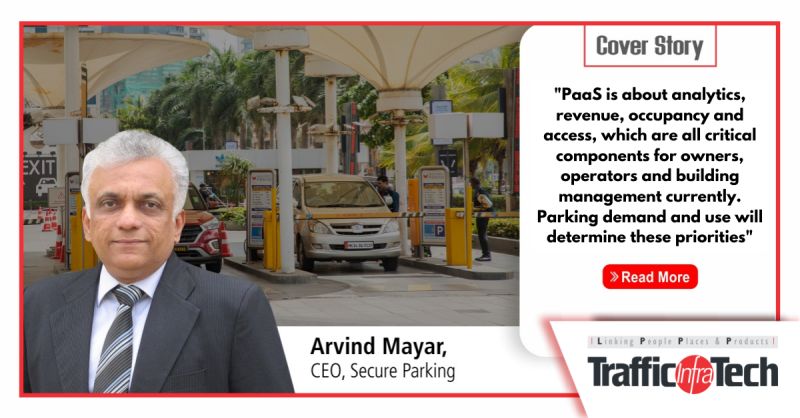Cover Story - Parking as a Service by our CEO Mr. Arvind Mayar
PaaS is about analytics, revenue, occupancy and access, which are all critical components for owners, operators and building management currently. Parking demand and use will determine these priorities.
– Arvind Mayar
Parking as a Service
At some point in the future, your autonomous vehicle will drop you off at your destination and go park itself in a designated spot, while you track the entire journey on your phone in real time. This is the basis of Parking as a Service and seems like a distant dream in India. But the trend is moving towards this form of smart parking.
At the moment, PaaS exists in the form of digitising parking spaces and making the entire process cashless. Arvind Mayar, CEO of Secure Parking says, “The definition of PaaS is not yet fully formulated and varies from the perspective of the end user. Parking as a Service is about data analytics and its application in providing ease of use to the consumer, monetising the car parks, helping in optimum utilization of the facilities, and providing ease of transaction in and out of the car park. These are all critical components for owners, operators and building management.”
The intention of PaaS is to simplify and automate the entire parking experience. It is being implemented in select buildings and office complexes across the world, with robotics and automated parking systems that require no human intervention. You drive in, stop your car on the marked points, and simply swipe your key card. The system does the rest. But with a growing number of vehicles on the road and reducing parking spots, the need for aggregated systems is increasing. “Along with shared ownership/usage and electrical vehicles, PaaS will further become a necessity and all pervasive for any kind of commuting. Hence, without doubt it will soon either merge into MaaS or will be a very important part of it.”
For a big bang revolution the participation of the private sector in a big way is essential. Currently the parking tariff is controlled by the Government at artificially low levels. Anyone wanting to invest in a public car park will not get a return on the investment considering the high cost of land, infrastructure and operating cost. City centres, where parking shortage is the maximum, have the highest cost of land. “For this, the Governments will have to deregulate the parking tariff, provide land on easy terms, subsidise infrastructure cost and allow for commercial activity on 2-3 floors to improve commercial viability
https://www.trafficinfratech.com/need-to-move-towards-parking-as-a-service/?utm_source=SocialMedia+&utm_medium=Articlecreative&utm_campaign=Mag_july_21_issue_a1
